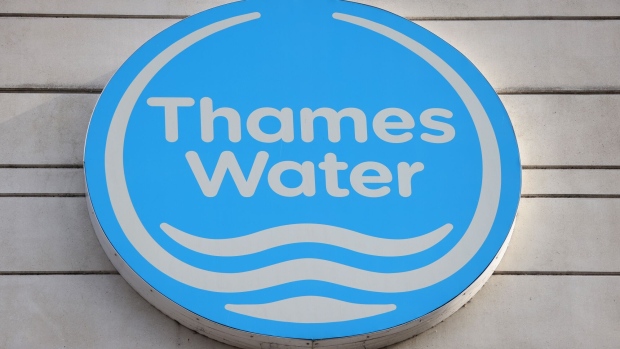Dec 5, 2023
Thames Water’s Debt Pile Swells: The London Rush
, Bloomberg News

(Bloomberg) -- Hi, I’m Leo from Bloomberg's UK Breaking News team, catching you up on this morning’s business stories.
Thames Water is causing a few waves after revealing that its debt pile swelled by 7% in the first half of the year to a staggering £14.7 billion.
Britain’s biggest water company is back in the spotlight after auditors warned that parent company Kemble may run out of money by April if shareholders don’t pump in more equity.
In October, Thames said bills will need to rise by 40% to help fund its five-year investment plan to 2030. But that has drawn ire from customers critical of Thames’s poor record on sewage spills and leakage.
The company continues to have “constructive discussions” with regulators on the scope of its plan and proposed regulatory arrangements, it said.
What’s your take? Ping me on X, LinkedIn or drop me an email at lkehnscherpe@bloomberg.net.
Key Business News
UK retail sales were sluggish in November as Black Friday discounts failed to lure droves of shoppers struggling with higher living costs, the British Retail Consortium and KPMG said. Festive spending is forecast to drop 13% to £20 billion this year, according to a separate PwC survey. The data contrast with a big rebound in consumer confidence in November tracked by market researcher GfK. In my mind, this only leaves room for two conclusions: 1) Britons are confident in their finances but spending more prudently, and/or 2) many people are leaving gift-buying to the last minute and retailers will see their stores and websites overflow in the final week before Christmas, which conveniently falls on a Monday this year.
Shares of Ashtead slid as much as 5.4% after the equipment-rental firm failed to reassure investors that its business is regaining momentum. The company, which issued a rare guidance cut just two weeks ago on lower emergency response activities and the Hollywood strikes, said "end markets in North America remain robust with healthy demand,” notwithstanding those factors.
Mid-cap broker Peel Hunt posted an £0.8 million pretax loss for the six months through September. The City firm said capital markets activity over the past two months also stayed “subdued” (a term it’s had to use for the past 12 months). My colleague Sofia Horta e Costa has more on London’s capital markets misery further down.
Finally, in a surprise move after yesterday’s market close, Qatar’s wealth fund offloaded almost half of its shares in Barclays in a £510 million deal. As you might expect, the fund didn’t say why it made the move. But it surely doesn’t look like a vote of confidence, given that Chief Executive Officer C.S. Venkatakrishnan is planning to announce a strategic overhaul in February. Qatar had invested about £4 billion in Barclays during a series of sales in the 2008 financial crisis, becoming one of its largest backers. The shares tumbled as much as 4.5% at the open.
Markets Today’s Take
The proportion of London-listed shares owned by pension funds has fallen to just 1.6%, a record low and drop from a peak of about 32% back in 1992, according to data from the ONS. But for all the lamenting that pension money is going abroad, many of the reasons for the decline in their ownership of UK stocks has to do with the basics of investment 101: diversification.
In the 1990s, the UK was a much bigger slice of the global equity market than it is now. The value of markets like China, India and France have since overtaken London, which now accounts for just 2.7% of the world’s total equity market. Why would you have so many of your eggs in a shrinking basket?
As well as investing in other equity markets, pension funds have also since allocated more to the bond market, especially in the wake of the financial crisis, as well as alternative investments like real estate, private equity and hedge funds.
So while the UK government is trying to remove some red tape (and could dangle a few tax incentives) in order to encourage pension funds to channel more money into smaller UK stocks and startups, the government can’t force this allocation. It needs to make sense from a risk-return perspective. If the UK stock market continues to lag the rest of the world, this will be a harder sell.
— Sofia Horta e Costa
For more news and analysis throughout the day, follow Bloomberg UK’s Markets Today blog.
What’s Next?
The Bank of England issues its biannual financial stability report 10:30 a.m. tomorrow, followed by a press conference with Governor Andrew Bailey. The central bankers had already given Britain’s biggest commercial banks a clean bill of health in July — so it’s their comments on the shadow banking sector (i.e. financial institutions that are not banks) we should watch out for.
At 7 a.m., we’ll get results from British American Tobacco. Investors will be keen to know what the Lucky Strike maker plans to do with an expected annual free cash flow of $3.9 billion. Bloomberg Intelligence reckons the money could be put into share buybacks and smaller acquisitions in the smoke-free product space.
--With assistance from Alexandria Arnold.
©2023 Bloomberg L.P.





